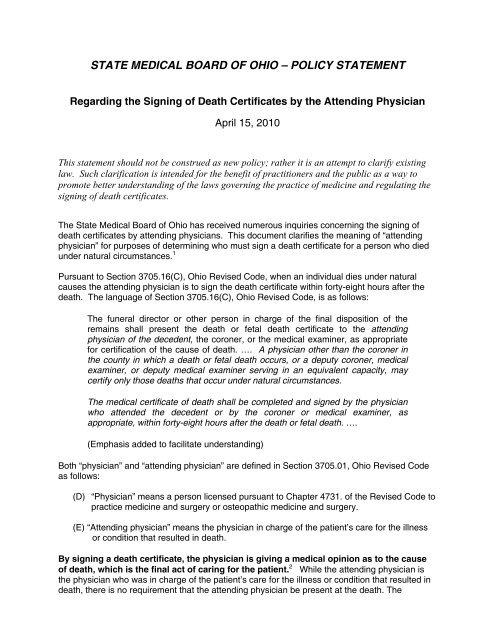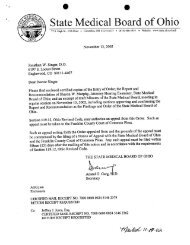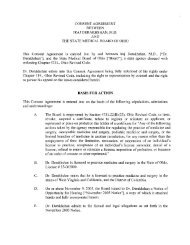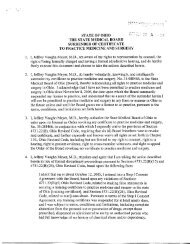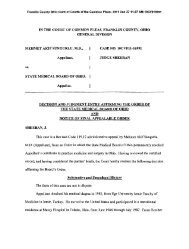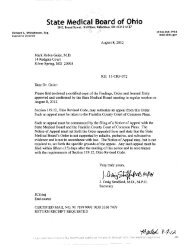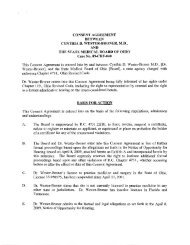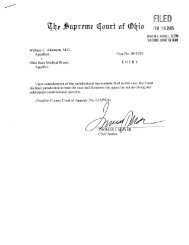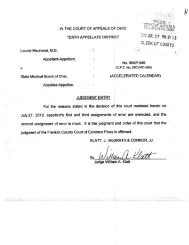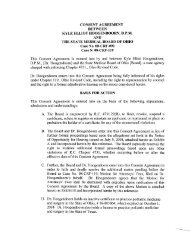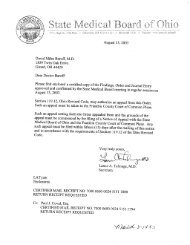Death Certificates – State Medical Board of Ohio Policy Statement ...
Death Certificates – State Medical Board of Ohio Policy Statement ...
Death Certificates – State Medical Board of Ohio Policy Statement ...
You also want an ePaper? Increase the reach of your titles
YUMPU automatically turns print PDFs into web optimized ePapers that Google loves.
STATE MEDICAL BOARD OF OHIO <strong>–</strong> POLICY STATEMENT<br />
Regarding the Signing <strong>of</strong> <strong>Death</strong> <strong>Certificates</strong> by the Attending Physician<br />
April 15, 2010<br />
This statement should not be construed as new policy; rather it is an attempt to clarify existing<br />
law. Such clarification is intended for the benefit <strong>of</strong> practitioners and the public as a way to<br />
promote better understanding <strong>of</strong> the laws governing the practice <strong>of</strong> medicine and regulating the<br />
signing <strong>of</strong> death certificates.<br />
The <strong>State</strong> <strong>Medical</strong> <strong>Board</strong> <strong>of</strong> <strong>Ohio</strong> has received numerous inquiries concerning the signing <strong>of</strong><br />
death certificates by attending physicians. This document clarifies the meaning <strong>of</strong> “attending<br />
physician” for purposes <strong>of</strong> determining who must sign a death certificate for a person who died<br />
under natural circumstances. 1<br />
Pursuant to Section 3705.16(C), <strong>Ohio</strong> Revised Code, when an individual dies under natural<br />
causes the attending physician is to sign the death certificate within forty-eight hours after the<br />
death. The language <strong>of</strong> Section 3705.16(C), <strong>Ohio</strong> Revised Code, is as follows:<br />
The funeral director or other person in charge <strong>of</strong> the final disposition <strong>of</strong> the<br />
remains shall present the death or fetal death certificate to the attending<br />
physician <strong>of</strong> the decedent, the coroner, or the medical examiner, as appropriate<br />
for certification <strong>of</strong> the cause <strong>of</strong> death. …. A physician other than the coroner in<br />
the county in which a death or fetal death occurs, or a deputy coroner, medical<br />
examiner, or deputy medical examiner serving in an equivalent capacity, may<br />
certify only those deaths that occur under natural circumstances.<br />
The medical certificate <strong>of</strong> death shall be completed and signed by the physician<br />
who attended the decedent or by the coroner or medical examiner, as<br />
appropriate, within forty-eight hours after the death or fetal death. ….<br />
(Emphasis added to facilitate understanding)<br />
Both “physician” and “attending physician” are defined in Section 3705.01, <strong>Ohio</strong> Revised Code<br />
as follows:<br />
(D) “Physician” means a person licensed pursuant to Chapter 4731. <strong>of</strong> the Revised Code to<br />
practice medicine and surgery or osteopathic medicine and surgery.<br />
(E) “Attending physician” means the physician in charge <strong>of</strong> the patient’s care for the illness<br />
or condition that resulted in death.<br />
By signing a death certificate, the physician is giving a medical opinion as to the cause<br />
<strong>of</strong> death, which is the final act <strong>of</strong> caring for the patient. 2 While the attending physician is<br />
the physician who was in charge <strong>of</strong> the patient’s care for the illness or condition that resulted in<br />
death, there is no requirement that the attending physician be present at the death. The
<strong>State</strong> <strong>Medical</strong> <strong>Board</strong> <strong>of</strong> <strong>Ohio</strong> <strong>Policy</strong> <strong>State</strong>ment<br />
Signing <strong>Death</strong> <strong>Certificates</strong> <strong>–</strong> page 2<br />
attending physician is expected to use medical training, knowledge <strong>of</strong> medicine, available<br />
medical history, symptoms, diagnostic tests, and/or autopsy results to render an opinion on the<br />
cause <strong>of</strong> death. 3 “Physicians’ Handbook on <strong>Medical</strong> Certification <strong>of</strong> <strong>Death</strong>,” U.S. Department <strong>of</strong><br />
Health and Human Services, Centers for Disease Control and Prevention, National Center for<br />
Health Statistics, 2003 Revision, and other resources are readily available through the <strong>Ohio</strong><br />
Department <strong>of</strong> Health website. “Physicians’ Handbook on <strong>Medical</strong> Certification <strong>of</strong> <strong>Death</strong>” is<br />
available at:<br />
http://www.odh.ohio.gov/ASSETS/81A61B63E12441279435ADAAA057888B/cmpdcert.pdf<br />
FREQUENTLY ASKED QUESTIONS<br />
1. May a physician in a graduate medical education program sign a death certificate?<br />
a. No, if the physician holds a training certificate.<br />
b. Yes, if the physician is a fully licensed <strong>Ohio</strong> physician.<br />
The physician who holds a training certificate is only authorized to render care under the<br />
supervision <strong>of</strong> an attending physician as part <strong>of</strong> a training program. 4 In contrast, the<br />
attending physician is a fully licensed physician. Although the training certificate holder<br />
renders medical care directly to a patient, the attending physician is responsible for the<br />
patient and in charge <strong>of</strong> the patient’s care. In name and practice, the physician supervising<br />
the training certificate holder is the attending physician. Accordingly, upon the death <strong>of</strong> the<br />
patient, the training certificate holder is not the physician in charge <strong>of</strong> the patient’s care for<br />
the illness or condition that resulted in death and is not the appropriate physician to sign the<br />
death certificate.<br />
2. Who is the attending physician for a patient in a long-term care facility?<br />
The attending physician for a patient in a long-term care facility may vary according to<br />
arrangements. The physician who provided medical care to the patient before admission to<br />
the facility may continue as the patient’s physician <strong>of</strong> record. In contrast, the patient’s care<br />
may have been transferred to the facility’s medical director. Whatever the wishes <strong>of</strong> the<br />
patient or guardian and physician, the records maintained by the facility should clearly<br />
indicate the name and contact information <strong>of</strong> the patient’s attending physician.<br />
A physician who has been serving as the attending physician for a patient in a long-term<br />
care facility who wishes to terminate the physician/patient relationship must comply with<br />
Rule 4731-27-01(A), <strong>Ohio</strong> Administrative Code. The requirements include written notice<br />
sent by certified mail to the patient or guardian stating that the relationship is terminated,<br />
although emergency treatment and access to services will be provided for up to 30 days.<br />
The facility should also be notified <strong>of</strong> the termination <strong>of</strong> the physician/patient relationship so<br />
that accurate information will be on file.<br />
3. What happens in the event the attending physician has not recently seen the decedent?<br />
By signing a death certificate, the physician is giving a medical opinion as to the cause <strong>of</strong><br />
death, which is the final act <strong>of</strong> caring for the patient. An attending physician who has not<br />
seen the patient for a period <strong>of</strong> time should apply medical training, knowledge <strong>of</strong> medicine,
<strong>State</strong> <strong>Medical</strong> <strong>Board</strong> <strong>of</strong> <strong>Ohio</strong> <strong>Policy</strong> <strong>State</strong>ment<br />
Signing <strong>Death</strong> <strong>Certificates</strong> <strong>–</strong> page 3<br />
available medical history, symptoms, diagnostic tests and/or autopsy results to render a<br />
medical opinion on the cause <strong>of</strong> death; qualify the etiology by use <strong>of</strong> words such as<br />
“probable” or “presumed” or, as a last resort, state the cause <strong>of</strong> death as “unknown,”<br />
“undetermined,” or “unspecified.” 5 Information on completing the cause <strong>of</strong> death portion <strong>of</strong><br />
the death certificate may be obtained from the <strong>Ohio</strong> Department <strong>of</strong> Health, Vital Support<br />
website at:<br />
http://vitalsupport.odh.ohio.gov/GD/Templates/Pages/ODH/ODHDefault.aspx?page<br />
For information on completing a death certificate, contact the <strong>Ohio</strong> Department <strong>of</strong> Health, Vital<br />
Statistics Field Unit at (614) 752-5190, option 3.<br />
For information related to the regulation <strong>of</strong> physicians and holders <strong>of</strong> training certificates,<br />
contact Sallie J. Debolt, General Counsel, <strong>State</strong> <strong>Medical</strong> <strong>Board</strong> <strong>of</strong> <strong>Ohio</strong>, 30 E. Broad St., 3 rd<br />
Floor, Columbus, OH 43215-6127, PH: (614) 644-7021; E-mail: Sallie.Debolt@med.state.oh.us.<br />
____________________________________________________________________________<br />
Endnotes:<br />
1 The county coroner must be called when any person dies as a result <strong>of</strong> criminal or other violent means, by casualty,<br />
by suicide, or in any suspicious or unusual manner, when any person, including a child under two years <strong>of</strong> age, dies<br />
suddenly when in apparent good health, or when any mentally retarded person or developmentally disabled person<br />
dies regardless <strong>of</strong> the circumstances. See Section 313.12, <strong>Ohio</strong> Revised Code.<br />
2 “Physicians’ Handbook on <strong>Medical</strong> Certification <strong>of</strong> <strong>Death</strong>”, U.S. Department <strong>of</strong> Health and Human Services, Centers<br />
for Disease Control and Prevention, National Center for Health Statistics, 2003 Revision, pages 4-5.<br />
3 Ibid, page 7.<br />
4 Section 4731.291(C), ORC, provides: The holder <strong>of</strong> a valid training certificate shall be entitled to perform such acts<br />
as may be prescribed by or incidental to the holder’s internship, residency, or clinical fellowship program, but the<br />
holder shall not be entitled otherwise to engage in the practice <strong>of</strong> medicine and surgery or osteopathic medicine and<br />
surgery in this state. The holder shall limit activities under the certificate to the programs <strong>of</strong> the hospitals or facilities<br />
for which the training certificate is issued. The holder shall train only under the supervision <strong>of</strong> the physicians<br />
responsible for supervision as part <strong>of</strong> the internship, residency, or clinical fellowship program. A training certificate<br />
may be revoked by the board upon pro<strong>of</strong>, satisfactory to the board, that the holder there<strong>of</strong> has engaged in practice in<br />
this state outside the scope <strong>of</strong> the internship, residency, or clinical fellowship program for which the training certificate<br />
has been issued, or upon pro<strong>of</strong>, satisfactory to the board, that the holder there<strong>of</strong> has engaged in unethical conduct or<br />
that there are grounds for action against the holder under section 4731.22 <strong>of</strong> the Revised Code.<br />
5 “Physicians’ Handbook on <strong>Medical</strong> Certification <strong>of</strong> <strong>Death</strong>”, U.S. Department <strong>of</strong> Health and Human Services, Centers<br />
for Disease Control and Prevention, National Center for Health Statistics, 2003 Revision, page 33.<br />
Approved April 15, 2010


